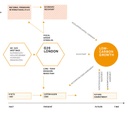04/20/2009 - On Thursday, 30 April 2009, Prince Charles will visit the Potsdam Institute for Climate Impact Research (PIK). The British heir apparent will visit the historical institute’s building on the Potsdam Telegraphenberg und attend a scientific workshop. Moreover, he will have preparatory discussions with Hans Joachim Schellnhuber, Director of PIK, about the second Nobel Laureates Symposium that will take place in London in May and is under the auspices of Prince Charles.

03/26/2009 – Measures of G20 members for economic recovery can trigger a boost of both sustainable growth and climate protection. This is the result of a policy paper presented in Berlin today. The report was authored by a team led by Ottmar Edenhofer of the Potsdam Institute for Climate Impact Research (PIK) and Lord Nicholas Stern, Chair of the Grantham Research Institute on Climate Change and the Environment at London School of Economics and Political Science (LSE). The report was prepared on behalf of the German Foreign Office. According to the paper, a global green recovery could deliver immediate and long-term economic benefits, help to avoid dangerous climate change, and reduce sources of global instability such as energy insecurity and competition for natural resources. The report highlights key measures in seven strategic areas that G20 members can take to tackle the economic crisis and re-orient development towards sustainable, low-carbon growth.
02/27/2009 – The members of the German Advisory Council on Global Change (WBGU) elected Hans Joachim (John) Schellnhuber as new chair und Dirk Messner as vice chair. The term of office is two years.

02/23/2009 – The risks of severe climate impacts increase drastically with only small increases in global mean temperature. An international team of researchers has reinvestigated the five “reasons for concern” described first in the Third Assessment Report by the Intergovernmental Panel on Climate Change (IPCC) in 2001, and revised a graphic depiction of their sensitivities to increases in global mean temperature. The diagram shows clearly how the borderline to dangerous climate change could be crossed much earlier than previously thought but also that ambitioned climate policy could minimize the associated risks.

24/11/2009 - Climate change is accelerating beyond expectations, urgent emissions reductions required, say leading scientists.

02/09/2009 - Oceanic acidification, as induced by anthropogenic emissions of carbon dioxide, modifies the marine carbon pump and triggers extended marine “oxygen holes” at intermediate depths. The lack of oxygen could harm marine habitats as well as their services to humans.

01/21/2009 - The Potsdam Institute for Climate Impact Research (PIK) is rolling out a new IBM supercomputer that will increase its computing capacity more than 30-fold. Potsdam researchers plan to employ IBM’s high-performance iDataPlex servers to more precisely predict weather events that have so far proven to be incalculable – extreme, short-term phenomena such as torrential rain or drought.

01/13/2009 - Jürgen Kurths today holds his inaugural lecture at the faculty of Mathematics and Natural Sciences at the Humboldt University Berlin. The mathematician accepted the call to the professorship for Nonlinear Dynamics at the University’s Physics Institute in May 2008. Since June 2008 he also co-chairs the research domain Transdisciplinary Concepts and Methods at the Potsdam Institute for Climate Impact Research (PIK). His research and teaching activities focus on the dynamics of complex networks. Kurths’ mathematical approach opens up new insights into the functionality of the Earth system.




